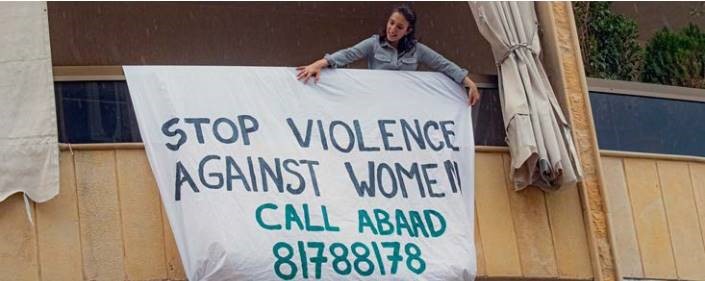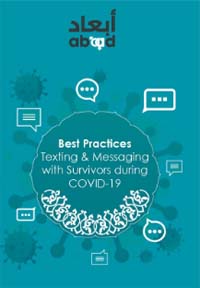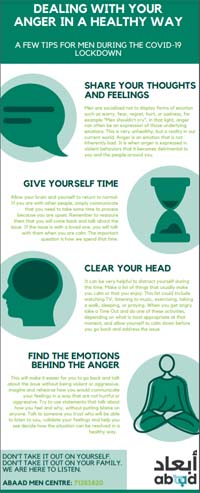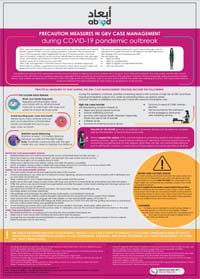To commemorate the 16 Days of Activism Against Gender-Based Violence (GBV), Stephanie Perlson and Rose Wilcher, co-chairs of the GBV Task Force of USAID’s Interagency Gender Working Group caught up with Gary Zeitounalian, gender program technical support with ABAAD Resource Center for Gender Equality in Lebanon, and with Wangechi Wachira, executive director at the Centre for Rights Education and Awareness (CREAW) in Kenya, to learn how they are adapting their programming to address the violence prevention and response needs of women and girls during the COVID-19 pandemic. Presented in two parts, these interviews offer practical insights and inspiration from program implementers and advocates on the front lines.
A Conversation With Gary Zeitounalian, ABAAD Resource Center for Gender Equality
Can you briefly describe ABAAD’s work to address GBV and other reproductive health issues?
Based in Beirut, Lebanon, ABAAD implements programs and conducts advocacy designed to end gender-based violence and achieve gender equality in the Middle East and North Africa (MENA) region. Among the direct services ABAAD provides throughout Lebanon are emergency helplines; emergency safe shelters that offer free and temporary housing for women and girls who are at risk of or survivors of GBV; Women and Girls Safe Spaces where GBV survivors can access comprehensive services, including case management, psychosocial support, clinical management of rape, referrals for family planning and reproductive health services, cash-based interventions, and legal consultations; and a Men Center that works with men, families, couples, and communities to promote nonviolent behavior and positive familial and social relationships. ABAAD collaborates closely with the Lebanese Ministry of Social Affairs and Ministry of Health to promote the sustainability of its programs. We also work throughout the MENA region to build the capacity of nascent organizations to adopt ABAAD’s successful interventions.
What are some of the most urgent GBV and reproductive health needs of women and girls that you’ve observed or heard about during the COVID-19 pandemic?
ABAAD experienced a spike in calls to our 24/7 helpline when the pandemic hit. After the first lockdown in March, traffic to the helpline doubled, primarily from women confined with perpetrators in their homes. And, between June, July, and August 2020, we received 1,472 calls compared to just 342 during the same period in 2019. In addition to callers reporting physical and sexual violence, our case workers noted an increase in emotional and verbal abuse, as well as an increase in denial of resources among beneficiaries calling the helpline. COVID came at a time in which Lebanon was already in financial crisis. Women reported not being able to get money from partners to access essential items, including food and diapers for children, and described increased tension in the household.
How is ABAAD trying to help address those needs?

On April 16, after the first lockdown, ABAAD launched a nationwide awareness campaign via social media platforms (YouTube, Instagram, Facebook, Twitter, and WhatsApp) and TV spots under the hashtag #LockdownNotLockup, asking people to share ABAAD’s Helpline from their balconies along with messages of solidarity. The purpose was to tell women residing behind closed doors that they are not alone and that they can reach out for support when needed. Hundreds of people took part in ABAAD’s initiative across Lebanon, sharing messages of hope and telling women that they don’t have to suffer in silence.
We have also been working with case workers to support GBV survivors and other women and families in economic distress by distributing dignity kits and food parcels. These distribution efforts are meant to ensure women have access to appropriate items to support hygiene, dignity and well-being, particularly in situations where their abusers may be withholding money to obtain such items. Furthermore, by addressing food insecurity, the food parcels may reduce household tensions and risk of intimate partner violence. ABAAD also provides cash-based assistance to those who are at increased risk of GBV and at risk of not being able to meet the basic needs of the household.
Certainly, violence against women and girls was a major global concern before the COVID-19 pandemic. What are some of the ways in which ABAAD has had to adapt its GBV programming in light of COVID-19, and what strategies seem to be working well?
From the outset of the pandemic, ABAAD put together a plan to ensure continuity of services by adopting remote programming. First, we developed guidelines on providing safe and confidential crisis counselling and emergency support services via phone and started providing remote case management for survivors. We also started using WhatsApp as a platform for connecting people and providing information. Through WhatsApp, we facilitated “e-awareness raising” sessions about COVID-19, which included sharing information about GBV. To accommodate participants with low literacy skills, we used voice messages, images, and videos throughout the discussions. We also created WhatsApp-based psychosocial support groups. With 12 participants per group, over the course of six sessions, we conducted exercises with participants designed to promote self-esteem and confidence and built a social support network for women online. Participants received WhatsApp bundles to ensure cost would not be a barrier to participation.
What advice do you have for policymakers who have an obligation to protect women and girls during the pandemic?
We have successfully advocated with the Ministry of Health for continued access to GBV and rape management services, both during the pandemic and after the blast that occurred in Beirut in August, for women at risk of or experiencing violence. We drafted The National Response to Violence Against Women During the COVID-19 Outbreak, and the Government of Lebanon endorsed ABAAD’s remote case management services and referrals to ABAAD’s helpline number. But, there is still a need for more support from policymakers to protect LGBTQ people, especially trans women, for whom experiences of GBV are also common. The Government also needs to urge a more coordinated response from all players— from UN agencies to civil society organizations— in order to strengthen violence prevention efforts and improve support services for survivors.
What are your top two or three pieces of advice for implementers who are working to prevent violence against women and girls or provide effective support to survivors right now?
We need three things: (1) Make sure that services are not interrupted, despite the challenges of the situation. (2) Make sure we are targeting the most vulnerable people; for example, migrants and trans women are underserved but are particularly vulnerable to violence during a crisis. (3) Adopt a standardized approach to GBV case management so that everyone providing support to survivors speaks the same language and survivors are receiving proper care.
Is there a “silver lining” thought related to how COVID-19 has shaped the world for women and girls that you’d like to share?
COVID has enabled us to broaden our reach. We are now able to reach beneficiaries that we weren’t able to reach before because of the shift to remote programming. We are now reaching people in rural areas and persons with disabilities who would otherwise not be able to physically access our services. They are now receiving awareness sessions over WhatsApp and participating in online support groups. We have also been able to engage more men in violence prevention. By promoting our men’s helpline and acknowledging that this is also a difficult time for men, we’ve been able to reach more men and engage them in remote workshops on anger and stress management and positive communication skills.
For more information and resources from ABAAD on addressing GBV during the COVID-19 pandemic, please visit: www.abaadmena.org/resources.
Some of the resources you’ll find include:





